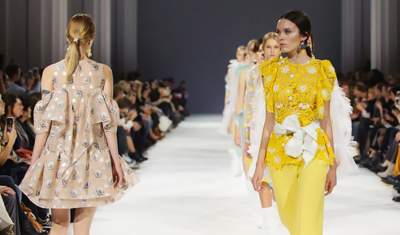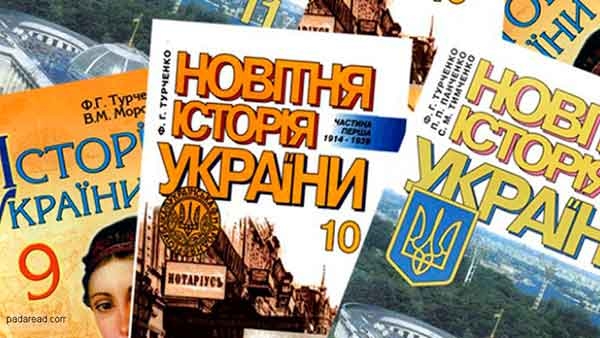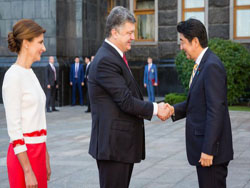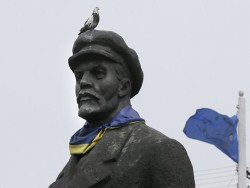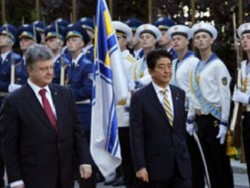
Not to say that the visit of Ukrainian President Petro Poroshenko in Japan have created a large wave of interest. Unless the personality of the President himself, managed in the midst of the punitive operation, called the Kiev “anti-terrorist”, when the fate of the Ukrainian units surrounded under Ilovaisk in the Donbas peacefully to resolve their offshore issues, getting rid of having to pay taxes to the Ukrainian state.
In Japan they say: the rich man, the ashtray: the more, the Messier. Although by itself this kind of information to surprise the Japanese. Corruption scandals here, including Prime Ministers, Ministers of state and party leaders – it is as common as in the rest of the world. However, during the national tragedy, which by definition is a civil war in Ukraine.
* * *
About Ukraine in Japan, of course, know something. But not so much on Maidan or the reflection of the mythical “Russian aggression”, how much the chocolates from the President Poroshenko. Japanese sweets traditionally unsweetened – no in the tradition of the Japanese people the production of decent candy or chocolate, although the Japanese lollipops Europeans praised for its delicate flavour. About Choco pie and other American ersatz, which are thoroughly hooked on the Japanese for decades of living under the nuclear umbrella of the US, seriously.
So when candy Roshen appeared in the land of chrysanthemums and blossoms, they immediately became a delicacy. Now you can buy them in supermarkets not only in Tokyo but also in many other cities, the average for 300 yen (70 USD) for 100 grams of candy. That is, the price is about the same as in Ukraine. Only the income of the average Japanese person somewhere in the 16 times higher than his colleagues in Ukraine.
With regard to knowledge more serious, situation is more modest. Being an economic giant, though slightly protoptannym two decades of stagnation in industry and stagnation in the agricultural sector, Japan is under Treaty with the United States on mutual cooperation and security assurances continues to be a political dwarf. Got to work on the US, whose interests all bollapragada in the Asia-Pacific region (APR). Because of the concern growing comprehensive power of China. Therefore in the spotlight of the Japanese media are events and processes in Asia Pacific.
Moreover, in the first place are those that directly affect the historical memory, the feelings and thoughts of the Japanese. “The Northern territory” (Russia’s Kuril Islands, southern Sakhalin). Disputed with China, the Senkaku Islands (Diaoyudao), which are economically and militarily confident it settles in Beijing. North and South Korea, formerly a Japanese colony. North Korea, bellicose regime brandishing nuclear weapons that the Japanese survivors of the tragedy of Hiroshima and Nagasaki, is a particularly sensitive issue. Far Europe with millions of migrants, and especially lost somewhere on its periphery ravaged and poverty-stricken Ukraine is the Japanese hard to understand.
The proverb “patience and a little effort” is well known in the East Slavic world, but only among Japanese labor has become a kind of cult. The people here are profoundly convinced that the way it is: if, in good faith, labor, prosperity and the respect of others past you will not pass. To imagine that you can work all you want, but the state you will select, and not get paid or will turn your money into dust is above the imagination of the Japanese. It is like one day to Wake up and see that the sacred mount Fuji disappeared, and the Emperor, the symbol of the state, abdicated.
* * *
If in Japan, remember about Ukraine, mostly during strong upheavals on the banks of the Dnieper. On the other hand, since the coups, I mean “revolution” in Ukraine happen quite often, some information about the distant and unknown country from time to time gets in the Japanese media. But, as a rule, in the interpretation, which coincides with the American interpretation of events and the linkage of territorial claims of Japan to Russia.
For example, the newspaper Sankei April 4, returning to the subject of the second anniversary of the occurrence of Crimea in structure of Russia, wrote: “the Annexation of Crimea nullified the Budapest Memorandum, under which the US, UK and Russia guaranteed the security of Ukraine in exchange for refusal from nuclear weapons. The incident with Crimea led to the escalation of the conflict in Eastern Ukraine… Given this, it is necessary to once again condemn Russia’s actions. This applies in particular to Japan, which still has not solved the problem of the Northern territories”.
Found in the media seems to be neutral point of view, actually, in the interests of Kiev.
Popular in Japan edition JBpress on March 30 stated: “For many reasons neither Ukraine nor in the Republic is not concerned that the terms of [the Minsk] agreements are not fulfilled. The Ukrainian side their implementation would bring certain losses. Would be reduced and Russian aid to the Republic’s leadership”.
It turns out that, first, both parties waive Minsk-2; secondly, solely for economic reasons.
About the xenophobic nature of the Kiev regime, about the true motives of the struggle of the people’s Republic, not one word. In the same stressed “neutral” spirit, the publication warns both sides that “in international politics there are many examples, when the superpowers themselves intervened to calm the situation, ignoring the opinion of direct participants of the conflict”.
By the way, in a different material JBpress admits that promised Ukraine’s Prime Minister Shinzo Abe at a summit of the G7 in 2014 150 billion yen of financial assistance will reach the addressee and will be used by Kiev to pay the debt in 3 billion dollars to Moscow. Japanese Prime Minister wants, they say, use this step as a preparation of his visit to Moscow to the long-awaited thaw in relations between the two countries. The publication writes that does not exclude such an option and the former Ambassador of Russia in Tokyo, and now Professor of MGIMO Alexander Cherepanov. Sovmestnom the statement of President Poroshenko and Prime Minister Abe in Tokyo said, however, that “assistance in the amount of 1.85 billion dollars” is “for reform”.
* * *
Some knowledge about Ukraine promote the exchanges of delegations between the sister-cities Kyiv and Kyoto, Odessa and Yokohama. There is also cultural exchange. Every year in Japan, tours the national Opera of Ukraine. In Kyoto held joint performances of young ballet artists of Ukraine and Japan. In November 2014 in Japan was the national Symphony orchestra of Ukraine. To speak of the existence in Japan of the Ukrainian Diaspora premature, but came back to work or to study Ukrainian citizens, United in a society “Crane”, the 200th anniversary of Taras Shevchenko in Meiji Park in Tokyo organized a flash mob. Based on the work of Shevchenko the Japanese on their own presented in Tokyo to the audience performances of “Princess” and “the flow”. At Tokyo University, there is the Association of Ukrainian studies. It is clear that such familiarity with Ukraine and its study covers a small number of citizens and does not affect the overall perception of a distant country.
Unfortunately, under the guise of cooperation in the field of culture and art, sometimes right on the streets of Japanese cities are available activities designed to support the Kiev regime and with anti-Russian content. For example, at the end of June 2014 with the participation of dissenters from the “Kiev Patriarchate” was held in Tokyo “Megamarch shirts” in support of “territorial integrity” of Ukraine. Several dozen marchers chanted Bandera slogan “Glory to Ukraine – heroes of Glory!” attracting the attention of numerous visitors of Ginza, the shopping district and cultural center of Tokyo. Such action produces a certain impression. After all, according to a local folk wisdom, “in a fight both sides are guilty”, and to delve into the details of local layman too busy.
* * *
Apart in the knowledge of the Ukraine are major Japanese companies. While the volume of Japanese investments in Ukraine is insignificant – only $ 188.9 million. But in early February, Ukraine and Japan signed an agreement to promote investment protection, providing the increase of investment attractiveness and the legal regulation of economic relations.
It is known that the Japanese are interested in purchasing of Ukrainian ports and the modernization of the power industry, which once again confirmed during the visit to Tokyo of the head of the Kiev regime. Speech, in particular, about application on Ukrainian thermal power plants of Japanese coal gasification technology. They allow you to use coal more efficient and throw less carbon dioxide into the atmosphere. Imports of natural gas will be reduced by 10% if the modernization will be subjected to all the Ukrainian coal-fired power plants.
The ongoing war and the growth of socio-political tensions in Ukraine threatening a new revolution, the optimism of potential investors do not inspire. However, not once has it happened with the Japanese when “the Shine of gold obscured the radiance of the Buddha”. In any case, they should have considered that in Ukraine they will have to face Chinese and American companies, as well as the lawlessness of the militants, who are increasingly take on the role of krasavella business. Homemade Yakuza is just a pathetic shadow of the Ukrainian Nazi repo men with manners.
* * *
Russian in spirit, but ethnic Ukrainian by descent blind thinker, writer and playwright Vasily Eroshenko spent in the land of the Rising Sun, as he later admitted, the best years of my life. Eroshenko wrote and published in Japanese. One of the best of his works – drama-fairy tale “the peach-colored Cloud”, which praised the beauty of the soul of the Japanese people, his faith in the victory of the forces of good in the world. Will there be a Japanese artist, who can with the same piercing force to sing?!

